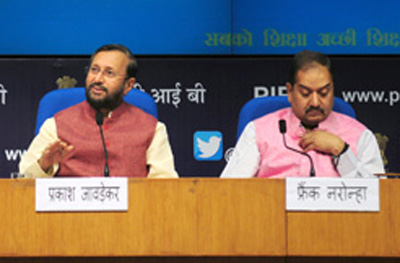
NEW DELHI, May 16:
Human Resource Develo-pment Minister Prakash Javadekar today said after providing access to education for all, the focus of the Government will be to ensure ”quality education to students across the country”.
Addressing a press conference on the three years’ achievements of the HRD Ministry from May 2014-2017, Mr Javadekar said the Government was thinking of expansion of Kendriya Vidyalaya in country in coming years. Fiftynine Kendriyva Vidyalayas had been started in the past three years since the NDA Government had come to power and 50 more had been sanctioned. Sixtytwo new Jawahar Navodaya Vidyalayas had been sanctioned of which 27 would be operational from this academic year.
The Government was thinking of expansion of Kendriya Vidyalayas in the country in the coming years, he said and was of the view that Navodaya Vidyalayas were a success story and that more such positive stories would emerge soon.
Citing Navodaya Vidyalayas as success of government schooling, he noted that of the 9,567 students appearing for the JEE, 3,567 had cracked JEE Mains and 481 of them had been admitted to IITs last year.
Giving a list of his ministry’s achievements, the Minister said the thrust of the Modi Government was on giving due importance to quality education, which he had taken up as a challenge. ”In schools we are notifying learning outcomes from Classes I to VIII, which have been put up in schools and given to parents and schools,” he pointed out.
To create accountability, the Government was hoping that Learning Outcomes notified would be the benchmark competency to be achieved by students in each standard, he added.
While as many as 21 lakh schools were giving free education where crores of students were getting free education, the Minister emphatically asserted that the Government was against commericalisation and private schools should have ”reasonable fees”.
Simultaneously, the Government was reforming teachers’ education and bringing back Board exams in Class X. ”We have organised ‘Shiksha Manthans’ or regional workshops in the country — Raipur, Guwahati in the East, Pune in Maharashtra, Bengaluru and the next in Chandigarh in North India, which would be held in the first week of June.”
About the proposed change in no detention policy, Mr Javadekar said Central Advisory Board of Education (CABE) had unanimously decided to give the right to states to detain or not to detain students. States had been authorised to detain students in Class V and or VIII standard after giving the student two chances. ”The Bill in this regard is in circulation,” he told reporters.
Further, all state boards and Central Board of Secondary Education had agreed not to inflate marks in board examinations, making them ”realistic”, he said.
In the field of higher education, the Minister said 20 world-class universities were to be created in India — 10 in the private sector. His Government had announced 7 new IIMs, six new IITs, one new Indian Institute of Information Technology (IIIT), two new Indian Institutes of Science Education and Research (IISERs) and one National Institute of Technolgoy and a Central University at Motihari.
For Higher Education Financing Agency (HEFA), the Minister announced that it would raise Rs 20,000 crore through market leveraging budgetary support of Rs 1,000 crore to finance creation and upgradation of research and other infrastructure. Asked about the 38 Central universities to be WiFi enabled from July 2017, Mr Javadekar said all Central Universities would be given wi-fi facilities from this academic year.
A many as three crore illiterate adults had achieved basic literacy of electoral literacy, financial literacy and legal literacy, he said. (UNI)

